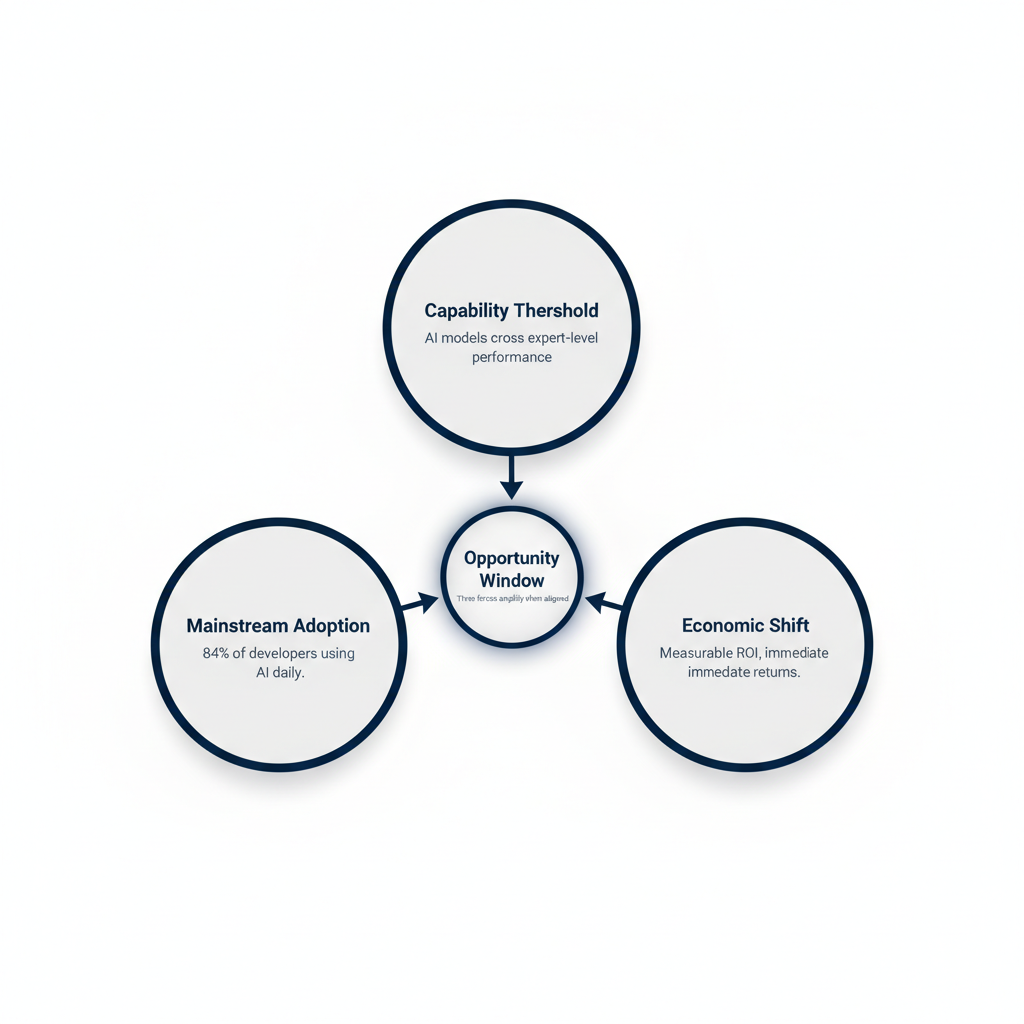The Billion-Dollar Question
The question isn't whether AI will create billion-dollar companies. It already is. The question is: how will you get a piece of it?
Two years ago, if you wanted to build a billion-dollar software company, you needed a specific playbook: Raise $100+ million, hire hundreds of engineers, compete directly against well-funded incumbents, and hope your idea was different enough to win market share. The odds were brutal.
Today, the playbook is broken. And that's your opportunity.
Consider what's now becoming possible: A solo developer, working with AI coding agents like Claude Code, could potentially orchestrate teams of specialized AI agents solving problems across multiple vertical markets simultaneously. No traditional software company with 100+ employees could coordinate that many parallel workflows. No hiring process could find talent that fast. No IT infrastructure could scale that efficiently.
This isn't science fiction. The technical capabilities exist today. Solo developers are already building and deploying AI agent systems that would have required entire engineering teams just two years ago. The path from "possible" to "proven at scale" is measured in months, not years.
This chapter explains why this transformation is happening and how you can position yourself to build a billion-dollar business in the AI era using concrete, actionable frameworks.
What's Changing Now
Three forces have converged to create this moment:
First: The tools crossed a capability threshold. AI models can now write entire features, debug complex issues, and refactor legacy code with near-expert performance. These aren't toys. They're production-ready development partners.
Second: Mainstream adoption happened fast. The 2025 Stack Overflow Developer Survey found that 84% of developers are using or plan to use AI tools, with 51% using them daily. This isn't experimental anymore—it's standard practice.
Third: The economics shifted dramatically. The return on investment is measurable, immediate, and compelling.
But here's what matters most: This transformation creates unprecedented opportunity for individuals. You don't need a large team, years of experience, or venture capital to build valuable software. You need understanding, strategy, and the ability to work effectively with AI agents.
💬 AI Colearning Prompt
Explore with your AI: "The lesson mentions three forces converging: capability threshold, mainstream adoption, and economic shift. Let's dig deeper—which of these three would you say is the MOST fragile? In other words, which one could reverse and close this opportunity window? Test your AI's reasoning, then share your own perspective."
That's what this chapter teaches you.
🎓 Expert Insight
Notice how this opportunity isn't just about AI getting better. It's about convergence. Tools crossed a threshold (technical), developers adopted them (social), and economics shifted (financial). When multiple independent forces align, opportunities compound. This is why timing matters: you're not just riding one trend, you're riding three trends that reinforce each other.

By the end, you'll understand why the path to a billion dollars no longer requires a traditional startup scaling curve, and how to take that path yourself.
🤝 Practice Exercise
Ask your AI: "If I had to pick ONE of the three forces (capability, adoption, economics) to prove to a skeptical investor, which one has the strongest evidence? Show me the data and explain why this evidence is convincing."
Expected Outcome: You'll understand how to evaluate claims with evidence and practice critical thinking with AI as your reasoning partner. You're learning to ask for justification, not just accept statements.
Try With AI
Use your AI companion tool set up (e.g., ChatGPT web, Claude Code, Gemini CLI), you may use that instead—the prompts are the same.
Prompt 1: Validate The Opportunity Claims
This lesson talks about solo developers orchestrating teams of AI agents across multiple markets. Help me understand: What's real today vs. what's still emerging? What makes this possible NOW that wasn't possible 5 years ago? Explain in simple terms—I don't have a business background.
Expected outcome: Clear understanding of current AI capabilities vs. near-future potential.
Prompt 2: Identify The Most Important Force
The lesson mentions 'three forces converged.' Break these down for me: (1) tools crossed a capability threshold, (2) mainstream adoption, (3) economics shifted. Which of these THREE is most important for someone like me [describe your situation: student / entrepreneur / career changer]? Why?
Expected outcome: Clear grasp of which force matters most for YOUR context.
Prompt 3: Understand Competitive Dynamics
Here's what I'm thinking: If AI makes building software easier, won't EVERYONE try to build companies? Won't that make it harder, not easier, to succeed? Let's explore this together. First, explain the counterargument (why more competition might actually create more opportunity). Then, I'll share my skepticism, and you adapt your reasoning based on my concerns. Let's iterate until I'm genuinely convinced, or until we identify the real risks I should watch out for.
Expected outcome: Confidence that this opportunity is accessible (not just for tech insiders), achieved through collaborative exploration where you test AI's reasoning and it adapts to your concerns.
Prompt 4: Assess Learning Requirements
The lesson says I don't need 'a large team, years of experience, or venture capital.' But I DO need 'understanding, strategy, and ability to work with AI agents.' Be honest: what's the MINIMUM I need to know or learn to actually capture this opportunity? Give me a realistic self-assessment framework.
Expected outcome: Realistic assessment of what you need to learn to get started.